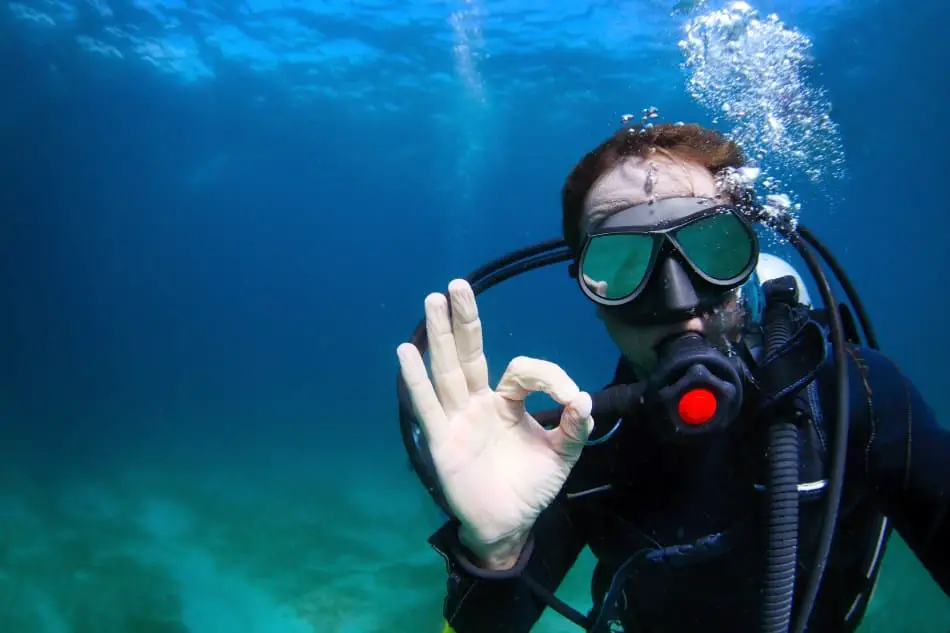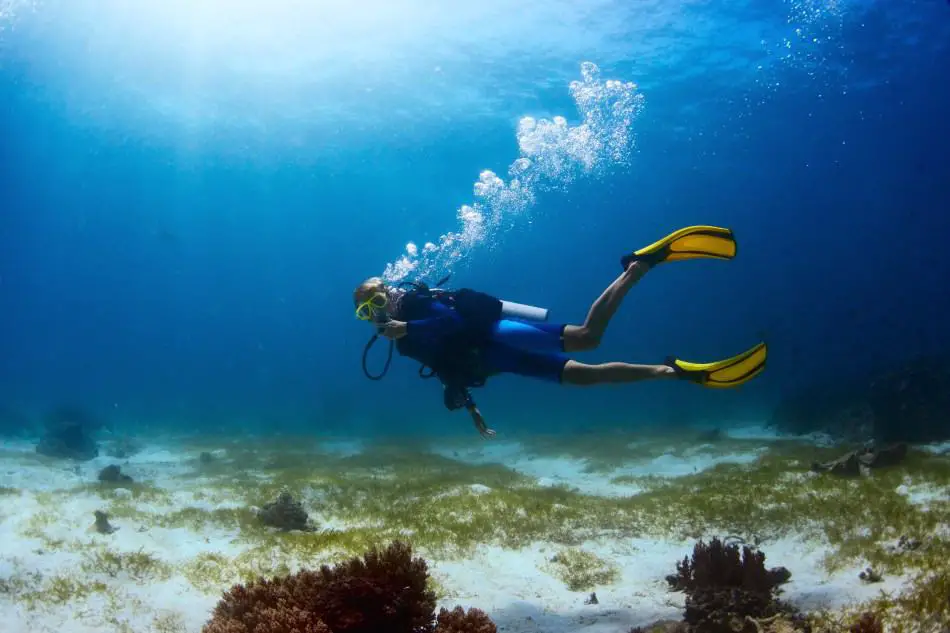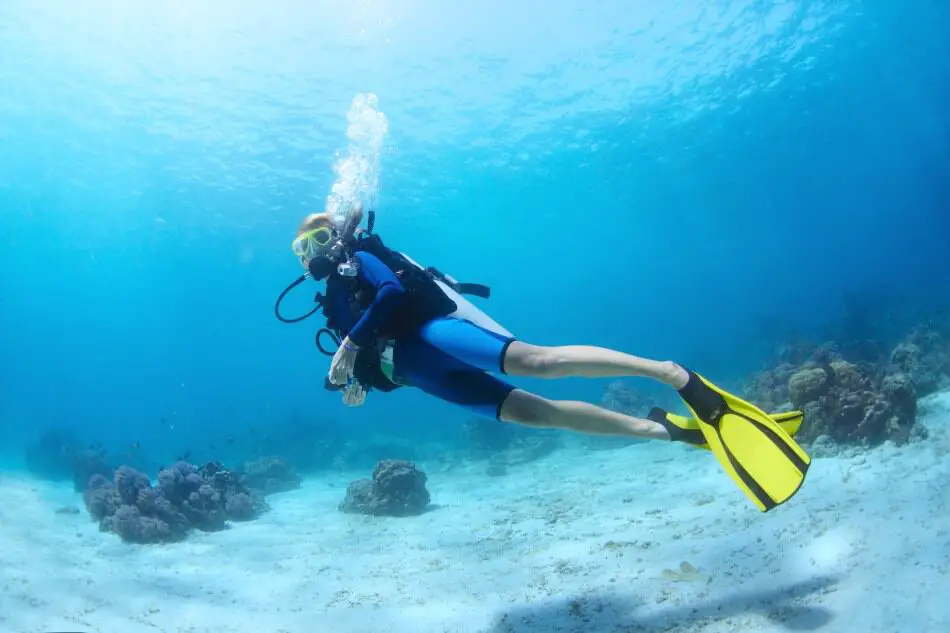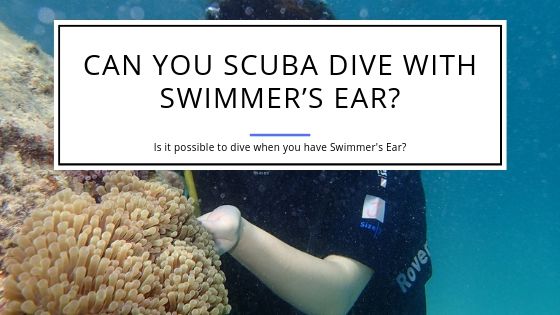Can You Scuba Dive with Swimmer’s Ear?
Diving is an exhilarating experience. The rush of the water, the crashing of the waves, the thrill of being in a whole new realm. But if you’re a frequent diver, you may have experienced that moment when you’re relaxing after your dive and your ear starts feeling wet and itchy.
Can you dive with Swimmer’s Ear? No, you can’t. Swimmer’s ear (otitis externa) is an infection on your outer ear and you will need to let the infection go away before diving again. Your doctor will treat the condition and let you know when you can go scuba diving again.
Swimmer’s ear starts out as slight irritation in your ear, but within a few hours, generally overnight, it develops into a strange fullness in your ear and a throbbing pain. The scientific term for this problem is otitis externa and is an ear infection that may occur if you swim a lot.
What Causes Swimmer’s Ear?
Swimmer’s ear is not caused by external bacteria, such as those found in the water. It is actually triggered by the bacteria present in your external ear canal. Let’s look at the science behind this infection:
When you frequently dive or swim in the water, the cells lining your ear canal swell up from all the fluid. This causes the cells to separate just enough to allow the bacteria on your ear’s surface to sink into your skin. This environment is conducive to their growth and they start to multiply.
This eventually leads to inflammation and itching in your ear canal. If it is not taken care of, this swelling can spread towards your face to the extent that even moving your jaw might cause great discomfort. If your infection has reached this stage, you need to get a medical plan from your doctor. You absolutely cannot get back in the water till the swelling has subsided and the pain has faded.
It is interesting to note that heat and humidity act as a breeding ground for the spread and expansion of these harmful bacteria.

How You Can Avoid It
It’s always ideal to take preventive measures rather than treating your ear after it gets infected. A drying solution in the ears can help combat the risk of swimmer’s ear.
Just keep the drying solution in your ear canal for 5 complete minutes at the beginning and end of the day. This same step can be used to treat the infection if you already have one.
Using some mineral oil or lanolin in your ears before you dive may also be an effective way of keeping your ears clean and protected.
Note: Any chemicals that you use in your ears are likely to be very strong and have a drying effect. If you feel like your ears are drying out too much or experiencing a burning sensation, then stop using the drops and consult your doctor.
Consult a Professional
The treatment for swimmer’s ear is not one that you can obtain without a prescription. Consult a doctor, get the right medicine and follow the provided regimen.
The key is to let the medicine stay in each ear for five minutes, and then each ear should be properly drained of the chemical. This will ensure maximum effectiveness.
This procedure should ideally be followed before and after your dive to keep your ear protected. Once the infection has started spreading, the treatment will be longer and a bit more painful.
Warning! If you fear that your eardrum may have sustained some damage, do NOT use any of these chemicals and medicines. This will act as a gateway for your bacteria to wash into the middle of the ear and the damage from the infection will be really serious.

Keeping Your Ears Clean
Frequent diving may cause earwax buildup, sealing off your external ear canal. If this happens, the chemical drops will no longer be effective and you will be at a greater risk of contracting swimmer’s ear.
Visit a doctor, or find someone skilled to use an otoscope. If the wax has blocked your eardrum, it needs to be cleaned out.
Don’t experiment with cotton swabs or other such methods that can be dangerous and can potentially cause long-term damage to your ear. Get a medical solution which you can use in the shower to flush out the excess buildup. If this doesn’t work, get your ears cleaned by your doctor.
Another trick you can use is to clean your ears by hand in the shower rather than spraying them directly. A direct flow may cause damage to your eardrum and affect your hearing.
Protecting Your Ears Underwater
You can opt to wear protective gear underwater to keep your ears safe. Here are some options:
Scuba Diving Ear Plugs
While these are great at keeping the water out of your ears, ear plugs also present the risk of accidentally falling out at any point during your dive. The reverse can also happen where they may get jammed into your ear due to water pressure.
Try getting your hands on earplugs with ventilation to prevent them from getting affected by water pressure. Certain ear plugs are designed specially by doctors and are ideal for deep sea diving.
Scuba Hood
A scuba hood covers your head and ears entirely. You will still need to wear your plugs underneath. There is a vast variety of scuba hoods ranging from thin, soft ones, to thicker ones for colder climates. If your ears are particularly sensitive, or you deep sea dive frequently, or the water is very cold, it is ideal to have a scuba hood on during your dive.
Scuba Mask with Ear Covers
To combat water pressure under the surface, you can make use of special scuba masks, which are designed to also protect your ears. These allow air to pass through your ear canal without letting in any water. It is much more comfortable than a hood, but provides a similar level of coverage. It also means that you don’t need to don an additional accessory when you go for your dive.

Simple Ways to Avoid the Risk of Swimmer’s Ear
Swimmer’s ear can even be caused by something as simple as the food you eat and the way you dive.
Dive Measures
Before you plunge in, use the age-old trick of holding your nose and blowing till you hear your ears pop. This way, you know that nothing blocked when you dive in.
When you dive in, don’t descend too fast as the instant accumulation of water pressure can damage your ears. You can make use of an anchor line to control your descent speed or use your dive computer to monitor your descent speed. This line can also assist you if the pressure is too much and you feel the need to stop for a bit.
Dietary Precautions
Certain dietary habits can assist the process of buildup in your ears. These include:
- Milk assists the process of mucus production;
- Alcohol and tobacco irritate the ear and spurt the buildup growth.
The Verdict
You absolutely cannot dive while you have swimmer’s ear and the infection is at its peak. Once your doctor confirms that the infection has passed, it is safe to get back into the water. Diving with swimmer’s ear will not only be extremely painful, it can also cause increased inflammation and may permanently damage your hearing.
At the end of the day, it’s all about taking the right precautionary measures. By cleaning out your ears regularly and properly, and adopting protective gear when you’re underwater, you can protect yourself from the risk of getting otitis externa (swimmer’s ear). If your ears still get infected, consult a doctor, follow the prescribed treatment and stay out of the water till your doctor gives the green signal.

